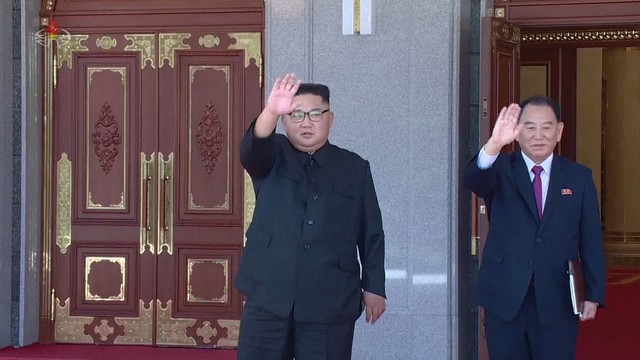 |
|
The Korean Central News Agency (KCNA) TV network reported on Sept. 6 that North Korean leader Kim Jong-un met with South Korea’s special delegation to North Korea the day prior. Behind Kim is Kim Yong-chol, Vice Chairman of the Central Committee of the Workers‘ Party of Korea. (Yonhap News)
|
Details of agreement to be decided at upcoming third inter-Korean summit
The South and North Korean leaders plan to reach an agreement on concrete measures to reduce military tensions, Blue House National Security Office Director Chung Eui-yong announced on Sept. 6. Many are now watching to see what kind of agreement is reached at the upcoming inter-Korean summit a little over ten days away. “We reached a decision to continue making progress with reducing the current military tensions between South and North and reach an agreement on concrete measures to build mutual trust and prevent armed clashes at the inter-Korean summit [scheduled for Sept. 18–20,” Chung explained that day while sharing the results of activities by a special envoy delegation that recently visited North Korea. While Chung did not provide an additional explanation, the context of his remarks suggests he was referring to measures agreed upon in principle at inter-Korean military general-level talks in July, including demilitarization of the JSA at Panmunjom, joint inter-Korean excavation of human remains in the DMZ, a pilot withdrawal of guard posts within the DMZ, and the suspension of hostile activities on the West (Yellow) Sea. Following those talks, senior delegation representative and Ministry of National Defense North Korea policy officer Gen. Kim Do-gyun said, “South and North Korea reached an agreement of opinion in broad terms on pursuing these areas and to continue with communications and working-level contacts on the concrete implementation timeline and methodology.” Since then, the two sides have been using the military communication lines restored in July to exchange documents in an effort to flesh out the four areas based on discussions at the time. “We are working on speeding up deliberations so that these areas of discussion can all be included in a comprehensive agreement at the inter-Korean summit in ten days,” a military official said. “We are also working to see that some explicit implementation plans are included,” the official added. South and North already “on the same page” regarding excavating remains from DMZ Progress in discussions on jointly excavating remains in the DMZ – as proposed initially by President Moon Jae-in – has reportedly been faster than in other areas. A military official explained, “This is an area where South and North are already on the same page, so there haven’t been a lot of differences in terms of devising an implementation plan.” But much ground remains to be covered for the other three areas, sources said. In connection with the withdrawal of DMZ guard posts, South Korean Minister of National Defense told the National Assembly National Defense Committee last month that the proposal had been to “first withdraw the closest guard posts between South and North Korea,” with an agreement to “withdraw around ten of them as a pilot effort.” But South and North Korea differ in the tactical ratios and significance of their guard posts, with just over 60 South Korean ones in the DMZ to around 160 for North Korea. It’s a fact that has translated into difficulties coordinating opinions on the two sides over how to strike a military balance with the mutual withdrawals. Demilitarization of the JSA at Panmunjom was proposed in an unexpected move by North Korea at inter-Korean military general-level talks in June. Despite high initial hopes, the area will reportedly require more discussions before a concrete plan can emerge. Some progress has been made in terms of halting hostile activities in the West Sea, with South Korea suspending the live-fire drills it had held every July to August off Baengnyeong Island and an inter-Korean international merchant vessel network being restored in July ten years after being halted in May 2008. But progress on issues such as a “maritime peace zone” has reportedly been slow. “These constitute operational arms control, but that’s an area that will require a lot of discussions because there has to be reduction of military tensions and the building of trust first,” a military official explained. By Park Byong-su, staff reporter Please direct comments or questions to [english@hani.co.kr]






